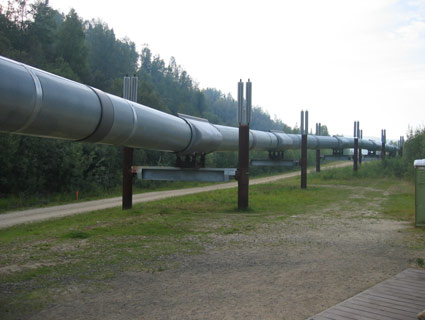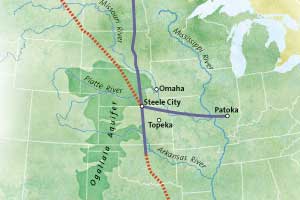It’s been a few weeks since we checked in on the proposed Keystone XL pipeline, a project that would carry oil from Canada’s tar sands down to refineries in Texas. Farmers and landowners in the states along the 1,661-mile pipeline‘s proposed route have raised concerns about the impact of potential spills or leaks to the Ogallala aquifer, which provides irrigation water to much of the Great Plains.
Last week, the National Farmer’s Union, the second-largest organization representing farmers in the United States, sent a letter to Secretary of State Hillary Clinton asking her to delay approval of the pipeline until there are assurances that the land and water in the region will be adequately protected. The group’s president, Roger Johnson, wrote in a letter obtained by Mother Jones:
The protection of our groundwater resources is critical not only to continuing farm operations, but as a source of drinking water for the vast majority of rural residents. NFU opposes any infrastructure or resource development that jeopardizes the health, safety and quality of the Ogallala and other freshwater aquifer resources. Given the inherent corrosiveness of the type of petroleum that the Keystone XL pipeline is intended to transport, the health of groundwater resources in the Ogallala and many other freshwater aquifers could be placed in jeopardy.
Because of these environmental and health risks, we urge you to delay approval of the proposed Keystone XL pipeline until farmers and ranchers are guaranteed adequate environmental protection. NFU supports an understandable process that clarifies when and how eminent domain can be used and who has what liability when there are damages from pipeline failure. We urge you to utilize every resource available to you to safeguard the natural resources upon which our nation and our family farmers, ranchers and rural residents depend.
Last month, the State Department granted more time for consideration of the project, and last week the agency issued a supplemental environmental impact statement (though enviro groups argue that it still does not thoroughly examine the potential dangers of the pipeline). There will now be a 45-day public comment period and a 90-day comment period for other federal agencies, like the Department of Energy and the Environmental Protection Agency, to weigh in on the pipeline project.










